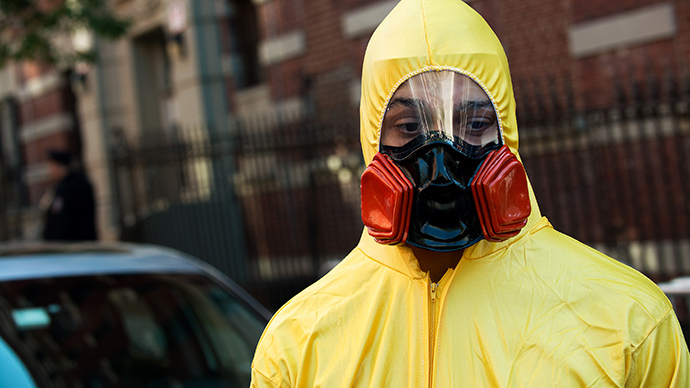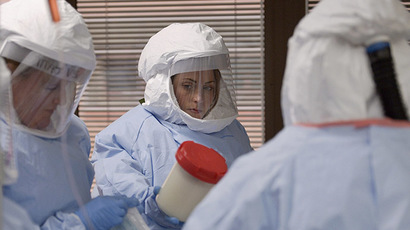‘I will go to court to attain my freedom’ – Maine nurse rejects quarantine over Ebola

The American nurse who is being quarantined against her will after returning from a mission in West Africa says she may sue officials in the state of Maine if they refuse to lift the restrictions they’ve imposed.
Kaci Hickox, the nurse, told ABC’s “Good Morning America” on Wednesday this week that she will soon outright reject the state’s attempt to keep her isolated, despite the requests from officials who fear that allowing the woman out of a Fort Kent, ME residence could lead to an Ebola outbreak.
“I will go to court to attain my freedom,” Hickox told the television network Wednesday morning during an interview conducted over Skype.
"I don't plan on sticking to the guidelines," Hickox added that same morning during an interview with NBC’s “Today” show. ''I remain appalled by these home quarantine policies that have been forced upon me even though I am in perfectly good health."
Defiant Ebola nurse Kaci Hickox: I will not be "bullied by politicians" over quarantine order http://t.co/EqLz6KnuYSpic.twitter.com/uztt4B6XGy
— NBC News (@NBCNews) October 29, 2014
In response, Maine Governor Paul LePage said Wednesday that state health officials are seeking “legal authority to enforce the quarantine,” the New York Times reported.
“We hoped that the health care worker would voluntarily comply with these protocols, but this individual has stated publicly she will not abide by the protocols,” LePage said in a statement. “We are very concerned about her safety and health and that of the community. We are exploring all of our options for protecting the health and well-being of the health care worker, anyone who comes in contact with her.”
Hickox, 33, arrived in the United States last week after volunteering in Sierra Leone with Doctors Without Borders, and became the first person forced to adhere to new mandatory quarantine rules put in place in New Jersey amidst the worst Ebola outbreak in history when she landed at Newark Liberty International Airport on Friday. Although Hickox has yet to exhibit any symptoms of the oft deadly disease, officials in New Jersey confined her to a tent when she arrived in the US in accordance with mandatory quarantine guidelines announced the same day she returned from West Africa. When she was finally released on Tuesday this week and arrived in Maine, she was asked to stay isolated as long as it’s possible for her to exhibit symptoms — upwards of 21 days since her last contact with an Ebola patient.
Currently, Hickox is confined to the off-campus home of her boyfriend, a nursing student at the University of Maine at Fort Kent, according to the Associated Press.
"I have been completely asymptomatic since I’ve been here. I feel absolutely great,” she said Wednesday.
Nevertheless, officials in Maine want the woman to stay isolated for the full three weeks, which may prompt her to pursue legal action.
"We do not want to have to legally enforce an in-home quarantine. We are confident that the selfless health workers, who were brave enough to care for Ebola patients in a foreign country, will be willing to take reasonable steps to protect the residents of their own country. However, we are willing to pursue legal authority if necessary to ensure risk is minimized for Mainers," Maine Department of Health and Human Services Commissioner Mary Mayhew told ABC News on Tuesday.
“We acknowledge that this protocol may go slightly beyond the federal guidelines," she said, but called it a "common-sense approach."
“The standard is, does Kaci have an infectious disease or agent? Is she harboring an infection?” Steven Hyman, an attorney for the nurse, said during Wednesday morning’s broadcast. “The answer is no. Medically, there is no basis to quarantine Kaci at this point in time.”
"Our position is very simple. There's no justification for the state of Maine to quarantine her. She has no symptoms and therefore she's not contagious. And she's not at a risk to the public or the health and welfare of people in the state of Maine," added Norman Siegel, who is also representing the woman.
"I am not going to sit around and be bullied by politicians and forced to stay in my home when I am not a risk to the American public," Hilkox said this week. Additionally, she says she’s concerned that enforcing such restrictions will hurt the efforts of American health workers who may want to travel to West Africa to aid Ebola patients as she had.
“I remain really concerned by these mandatory quarantine policies for aid workers,” she said. "I think we’re just only adding to the stigmatization that, again, is not based on science or evidence.”
Meanwhile, US Secretary of Defense Chuck Hagel said on Wednesday that the American troops deployed to West Africa to assist with combating Ebola will be subjected to a 21-day quarantine upon returning home.














